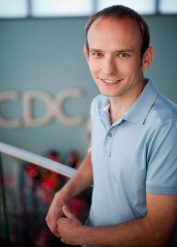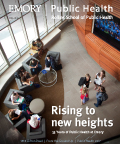Biggerstaff leads alumni board
Matthew Biggerstaff 06MPH serves as president of the RSPH Alumni Association Board. Here, he describes his work as an epidemiologist and his role with the alumni association.
|
Matthew Biggerstaff 06MPH* *Biggerstaff serves in his personal capacity as president of the RSPH Alumni Association Board. The views expressed here are his own and do not necessarily represent the views of the CDC or the United States. |
Q. What is your professional role in public health?
A. I work on the Surveillance and Outbreak Response Team within the Influenza Division at the CDC. My work has revolved around the 2009 H1N1 influenza pandemic. Currently, I am the lead analyst on a project that monitors influenza-like illness (ILI) through the Behavioral Risk Factor Surveillance System (BRFSS). This novel use of the BRFSS has helped us understand and describe the epidemiology of ILI among the U.S. population. I also collaborate on special pandemic influenza projects as needed. These include studies to analyze early pandemic cases, summer and fall pandemic deaths, and racial disparities among influenza outcomes.
Q. Why did you join the CDC?
A. I’ve always had a desire to work at the federal level in public health. A question on one of my college applications asked what my professional goals were in 20 years, and I wrote, “to be director of the CDC.” So when it came time to apply for jobs after Rollins, I searched out opportunities at the CDC. I was extremely lucky and got a “dream” job offer with the foodborne group. I took the job and have enjoyed the CDC ever since.
Q. What lessons have you applied from Rollins in your work?
A. The greatest lesson I learned was the importance of collaboration. It doesn’t matter how great a writer, statistician, or researcher you are. If you can’t work with other people from different backgrounds effectively and really enjoy it, then this kind of work is not going to be fun.
Q. What or who inspires you?
A. I am inspired by all of the dedicated state, local, and federal public health professionals I have worked with during foodborne and influenza-related responses. My colleagues continue to amaze me. They put in many extra hours on nights, holidays, and weekends (even in this era of budget shortfalls when many are not getting paid for regular workdays) to ensure the public is protected. Their collective dedication to public health is my surrogate role model.
Q. Why have you been active in the RSPH Alumni Association?
A. Emory and Rollins have shaped my career, giving me the scholarship assistance, the network, and the technical skills that I needed to become an epidemiologist in a job that I love. The least I can do in return is to offer my time to help the school, whether by making a gift, mentoring a current student, or serving on a panel before prospective students.
Q. What are your goals as board president?
A. My main goal is to start changing the perception among some alums that the association exists only to raise money. I want to find a way to connect with those alumni. We’re going to try some different volunteer and social activities, here in Atlanta and around the country, to engage alumni so they can see that every interaction doesn’t end with our hands out. Financial support of the school is important, but it’s not the only way to interact with Rollins once you graduate.
Q. Where do you see yourself 10 years from now?
Well, I am much wiser than I was 10 years ago, so I won’t say director of the CDC. But I do hope that I am still here working in the trenches on some outbreak response. I love the thrill and excitement of an outbreak investigation, and I can’t think of anything else I’d rather be doing.



